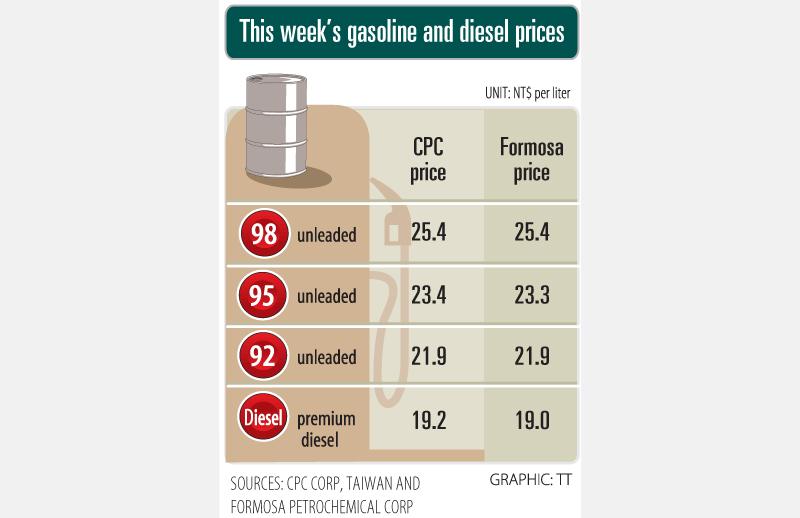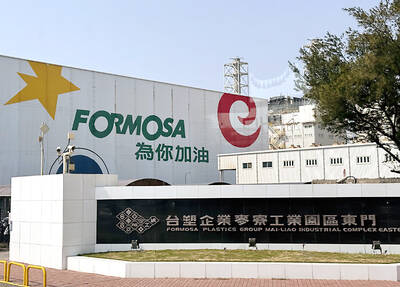CPC Corp, Taiwan (CPC, 台灣中油) yesterday said that its gasoline and diesel prices would remain unchanged from last week, a move echoed by its privately run rival, Formosa Petrochemical Corp (台塑石化).
Prices at CPC stations would remain at NT$21.9, NT$23.4 and NT$25.4 per liter for 92, 95 and 98-octane unleaded gasoline respectively, while the price of premium diesel would remain at NT$19.2 per liter, CPC said in a statement.
It had previously raised its prices for two consecutive weeks.

International oil prices rose slightly last week after Moderna Inc announced that its experimental COVID-19 vaccine was 94.5 percent effective and the crude oil processing volume in China continued to increase, indicating that the global economy is expected to recover, CPC said.
While its gasoline and diesel prices should have increased by NT$0.8 and NT$1.0 per liter respectively this week based on its floating oil price formula, CPC said that it would absorb the cost increase to comply with a government policy of keeping domestic fuel prices the lowest in Asia.
Formosa said that it was leaving the prices of its 92, 95 and 98-octane unleaded gasoline unchanged at NT$21.9, NT$23.3 and NT$25.4 per liter respectively, while the price of premium diesel would remain at NT$19.0 per liter.

EXTRATERRITORIAL REACH: China extended its legal jurisdiction to ban some dual-use goods of Chinese origin from being sold to the US, even by third countries Beijing has set out to extend its domestic laws across international borders with a ban on selling some goods to the US that applies to companies both inside and outside China. The new export control rules are China’s first attempt to replicate the extraterritorial reach of US and European sanctions by covering Chinese products or goods with Chinese parts in them. In an announcement this week, China declared it is banning the sale of dual-use items to the US military and also the export to the US of materials such as gallium and germanium. Companies and people overseas would be subject to

Taiwan Semiconductor Manufacturing Co (TSMC, 台積電) founder Morris Chang (張忠謀) yesterday said that Intel Corp would find itself in the same predicament as it did four years ago if its board does not come up with a core business strategy. Chang made the remarks in response to reporters’ questions about the ailing US chipmaker, once an archrival of TSMC, during a news conference in Taipei for the launch of the second volume of his autobiography. Intel unexpectedly announced the immediate retirement of former chief executive officer Pat Gelsinger last week, ending his nearly four-year tenure and ending his attempts to revive the

WORLD DOMINATION: TSMC’s lead over second-placed Samsung has grown as the latter faces increased Chinese competition and the end of clients’ product life cycles Taiwan Semiconductor Manufacturing Co (TSMC, 台積電) retained the No. 1 title in the global pure-play wafer foundry business in the third quarter of this year, seeing its market share growing to 64.9 percent to leave South Korea’s Samsung Electronics Co, the No. 2 supplier, further behind, Taipei-based TrendForce Corp (集邦科技) said in a report. TSMC posted US$23.53 billion in sales in the July-September period, up 13.0 percent from a quarter earlier, which boosted its market share to 64.9 percent, up from 62.3 percent in the second quarter, the report issued on Monday last week showed. TSMC benefited from the debut of flagship

TENSE TIMES: Formosa Plastics sees uncertainty surrounding the incoming Trump administration in the US, geopolitical tensions and China’s faltering economy Formosa Plastics Group (台塑集團), Taiwan’s largest industrial conglomerate, yesterday posted overall revenue of NT$118.61 billion (US$3.66 billion) for last month, marking a 7.2 percent rise from October, but a 2.5 percent fall from one year earlier. The group has mixed views about its business outlook for the current quarter and beyond, as uncertainty builds over the US power transition and geopolitical tensions. Formosa Plastics Corp (台灣塑膠), a vertically integrated supplier of plastic resins and petrochemicals, reported a monthly uptick of 15.3 percent in its revenue to NT$18.15 billion, as Typhoon Kong-rey postponed partial shipments slated for October and last month, it said. The